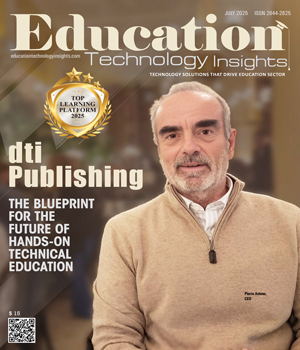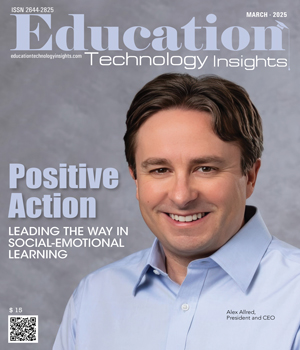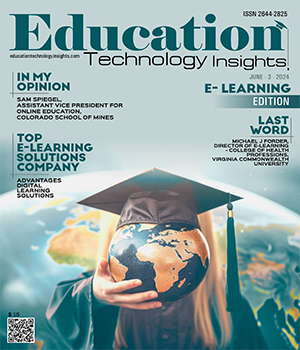THANK YOU FOR SUBSCRIBING
Be first to read the latest tech news, Industry Leader's Insights, and CIO interviews of medium and large enterprises exclusively from Education Technology Insights
Empowering the Future of Online Learning: A Holistic Vision for Transformational Education
Mark Campbell, Director of Online Learning, Holy Family University
 Mark Campbell, Director of Online Learning, Holy Family University
Mark Campbell, Director of Online Learning, Holy Family UniversityIn today’s rapidly evolving educational landscape, the potential of online teaching and learning extends far beyond access and convenience. It offers an opportunity for meaningful transformation for faculty, students, and institutions alike. At the intersection of transformational learning, faculty and student development, and the thoughtful integration of educational technology and AI lies a powerful catalyst for growth, equity, and innovation in higher education.
My work in the online learning space is anchored in the belief that technology should not merely replicate traditional classroom experiences but reimagine them. Drawing on Mezirow’s Transformative Learning Theory, I view education as a process of perspective transformation, an internal shift in how individuals perceive themselves and the world around them. This perspective informs the design of online experiences that are not only engaging but also reflective, inclusive, and deeply personal. Online learning environments, when intentionally crafted, can cultivate critical self-awareness and challenge students to grow intellectually, socially, and ethically.
A key element in facilitating this transformation is the intentional development of faculty and students. For faculty, teaching online is not simply about mastering a new platform; it is about redefining pedagogical identity. I have worked extensively to support instructors through faculty development programs that foster confidence, creativity, and a learner-centered mindset. These programs emphasize instructional design, inclusive pedagogy, digital literacy, and the strategic use of technology to create engaging, equitable, and measurable learning outcomes.
For students, especially those navigating online learning for the first time, robust support structures are essential. Developing digital fluency, cultivating a sense of belonging, and ensuring timely feedback and support are key components of a positive online learning experience. Through targeted workshops and engaging learning modules, I have empowered students to build the skills and resilience needed to succeed in virtual environments, turning potential obstacles into opportunities for growth.
Educational technology, when selected and used with purpose, enhances— not replaces—human connection. From learning management systems to collaborative tools and multimedia platforms, I advocate for technologies that enhance interaction, promote collaboration, and make learning more visible. I work with faculty to integrate tools that align with course goals, assessment strategies, and student needs, ensuring that technology serves pedagogy rather than dictates it.
The integration of Artificial Intelligence (AI) marks the next frontier in online learning. While AI raises important ethical questions, it also presents profound opportunities to personalize learning, automate feedback, and support student success at scale. I approach AI not as a replacement for educators, but as an extension of their capabilities. AI-powered tools can help identify struggling students early, recommend content tailored to learner progress, and assist in managing administrative tasks, allowing faculty to focus more on teaching and mentorship.
Importantly, we need to emphasize the need for critical engagement with AI in education, addressing issues of bias, transparency, and student privacy. Faculty and students alike must be equipped not just to use AI tools, but to understand and question them. In my work, I aim to foster a culture of digital responsibility and ethical innovation.
At the heart of all these efforts is a commitment to human-centered learning, grounded in empathy, inquiry, and transformation. Whether designing an online course, mentoring a faculty member, or exploring the affordances of a new technology, I bring a systems-thinking approach that connects vision to action. Collaboration across departments and disciplines is essential to building ecosystems that support sustainable, scalable, and mission-aligned online education.
In an era where education must continuously adapt to social, technological, and global shifts, we should remain committed to shaping online learning as a transformative force for equity, opportunity, and lifelong learning. Through strategic planning, innovative practice, and inclusive leadership, I strive to create environments where faculty and students not only succeed but flourish— where the promise of online learning becomes a lived reality.
Weekly Brief
ON THE DECK
Read Also
Building Future Leaders with Faith and Integrity
Virtualization as a Bridge For Multi-Campus Support
Building Practical Readiness in Cybersecurity Talent
The Liberal Arts to the Rescue
Faith Based Counseling Supporting Holistic Student Growth
Will ChatGPT End Higher Ed? Not So Fast

I agree We use cookies on this website to enhance your user experience. By clicking any link on this page you are giving your consent for us to set cookies. More info



























